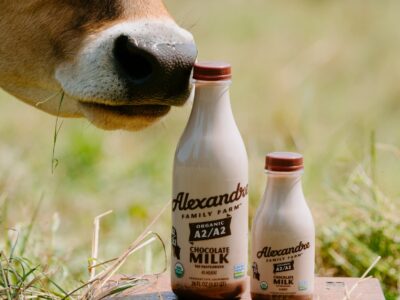Meet Gavin Spoor: A 22-year-old first generation farmer and popcorn entrepreneur
Some children dream about becoming a professional athlete. Others want to be a movie star or a doctor. Maybe an astronaut. As a kid, Gavin Spoor wanted to be a farmer, and now, at the young age of 22, he is a flourishing farmer who has quickly moved from his first six acres of land to 600 acres in only four short years.
The enterprising farmer lives by the maxim: “dreams only work if you do,” and while his dogged determination accounts for some of his success, it might short-sell the smart approach Spoor has taken to achieve his dream.
“I knew I wanted to farm since I was really young. I just didn’t know how I was going to make it happen,” Spoor revealed in an interview with HeartBeat Magazine. He doesn’t come from a family of farmers (his grandfather was one but he died before Spoor was born); however, he has grown up living in the farm country of Martinsburg, Missouri.
During his teen years, Spoor worked after school and on weekends for local farmers from whom he received an invaluable education, learning how to pick the right seeds for a crop and the correct fertilizer to use, how to operate farm machinery, and how to properly prep fields for farming. In high school, he also actively participated in the Future Farmers of American organization. In fact, Spoor placed on the state level in both Agronomy and Forestry, and was a state winner in Grain Production Placement.
As Spoor was starting at the University of Missouri-Columbia, the then-18 year old got the opportunity to cash rent six acres of soybeans. With the help of the Farm Credit Services Financial’s Young, Beginning, Small Farmer Loan Program, Spoor was able to secure the capital he requested to get seed, fertilizer and equipment. His first soybean harvest was big enough to help pay for some of his college classes as well as put a down payment on his first tractor, a classic International 1066 model.
Buoyed by his auspicious start, the first generation farmer continued juggling being a full-time student along with tending to his soybean field. Ironically, he basically went to college to learn how to become a farmer. “The reason I went to college is because I thought farming was going to be too difficult,” Spoor told Successful Agriculture Magazine, adding “my goal was to get an ag degree and land a job with a large ag company where I’d give up my dream of full-time farming.”
Of course, he didn’t have to abandon his dream, because it was already a reality. He worked at making both his crops and his business – which he named Spoor Farm – grow. And grow it did! In 2018, he was farming corn and soybeans on 120 acres, which he expanded to 200 acres in 2019 and 600 acres in 2020.
Spoor’s business, however, did encounter some potentially disastrous situations. The drought of 2018 severely affected his harvest, making him realize that he had to diversify beyond corn and soybeans. Initially, he considered farming vegetables, but soon recognized other opportunities were better aligned with his goals.
“I don’t really have enough time to sit by a vegetable stand, but I was looking for a crop that had a higher margin (than) corn and soybean markets.” Spoor explained to KOMU-TV. Examining his situation more analytically, the college student deduced that popcorn was the perfect choice. Not only is it popular with a long shelf life, but it also required similar equipment Spoor used for his regular field corn.
The first year, Spoor devoted only 15 acres to growing popcorn, but now he has over 40 acres, with popcorn quickly becoming Spoor Farm’s signature crop. Popcorn has also moved Spoor Farm into the retail world. It is sold in over a dozen regional supermarkets while Spoor’s online business sells popcorn in sacks, jars, bags, and on “poppable ears” to consumers around the country.
Spoor’s retailing success combines traditional pound-the-pavement salesmanship and tech-savvy marketing. He took a door-to-door approach to get stores to stock his popcorn. “I literally walked in the door and said, ‘Hey, is your manager here? Can I talk to him? I’ve got a product. What would it take to sell at your store?’” he’d ask. Additionally, Spoor savvily provides a shelf to hold his products in retail outlets. “It helps my product sell, but it also helps the store because if they sell my product, I provide that shelf free of charge.”
The tech-attuned 22-year-old has used the power of the internet to spread the word about Spoor Farm popcorn out into the universe. He observed that traditionally there has been a significant disconnect between farmers and consumers, so he has used social media platforms and YouTube to get the public more interested and invested in how food is produced. He posts videos on his farming techniques and machinery, and has over 6000 followers on Instagram alone. Spoor has found that popcorn can be a particularly entertaining crop. “There are not many foods you can watch explode,” he recently told The Mexico Ledger.
Spoor has found that sharing his story – to both consumers and stores – is an effective way to make his brand more distinctive, which is vital in order to survive in the marketplace. “I can’t compete on price, and I don’t want to,” he revealed in his HeartBeat Magazine profile. “I try to compete with the story. I try to add value to my product by telling the story behind it.”
Spoor’s interest in explaining farming’s ins-and-outs, however, isn’t just a marketing device to him. It is also a way to give back to the agricultural community along with helping to seed the next generation of farmers. “There’s going to be a lot of farmers that are retiring, and there’s going to be a lot of shoes to fill,” he shared in an interview he did for his College of Agriculture, Food & Natural Resources. It’s with this in mind that Spoor, who recently graduated with a degree in Agricultural Systems Management, gives talks and presentations in local schools and to FFA groups.
Now that his dream of having a farm has been achieved, Spoor has a new dream. He wants to start a scholarship fund to help people get into agriculture — particularly those who don’t come from a farming background. As he states in his CAFNR profile, “I want to help kids like me get involved with it also.”





